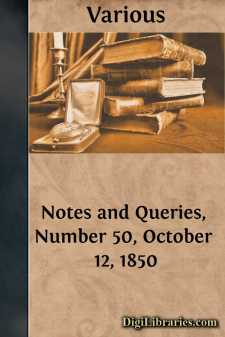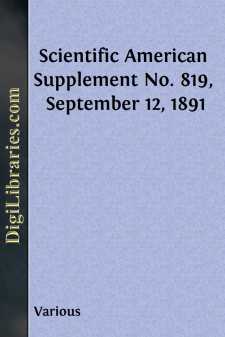Categories
- Antiques & Collectibles 13
- Architecture 36
- Art 48
- Bibles 22
- Biography & Autobiography 813
- Body, Mind & Spirit 142
- Business & Economics 28
- Children's Books 17
- Children's Fiction 14
- Computers 4
- Cooking 94
- Crafts & Hobbies 4
- Drama 346
- Education 46
- Family & Relationships 57
- Fiction 11829
- Games 19
- Gardening 17
- Health & Fitness 34
- History 1377
- House & Home 1
- Humor 147
- Juvenile Fiction 1873
- Juvenile Nonfiction 202
- Language Arts & Disciplines 88
- Law 16
- Literary Collections 686
- Literary Criticism 179
- Mathematics 13
- Medical 41
- Music 40
- Nature 179
- Non-Classifiable 1768
- Performing Arts 7
- Periodicals 1453
- Philosophy 64
- Photography 2
- Poetry 896
- Political Science 203
- Psychology 42
- Reference 154
- Religion 513
- Science 126
- Self-Help 84
- Social Science 81
- Sports & Recreation 34
- Study Aids 3
- Technology & Engineering 59
- Transportation 23
- Travel 463
- True Crime 29
Notes and Queries, Number 50, October 12, 1850
by: Various
Categories:
Description:
Excerpt
NOTES.
A NOTE ON "SMALL WORDS."
"And ten small words creep on in one dull line."
Most ingenious! most felicitous! but let no man despise little words, despite of the little man of Twickenham. He himself knew better, but there was no resisting the temptation of such a line as that. Small words he says, in plain prosaic criticism, are generally "stiff and languishing, but they may be beautiful to express melancholy."
The English language is a language of small words. It is, says Swift, "overstocked with monosyllables." It cuts down all its words to the shortest possible dimensions: a sort of half-Procrustes, which lops but never stretches. In one of the most magnificent passages in Holy Writ, that, namely, which describes the death of Sisera:—
"At her feet he bowed, he fell: at her feet he bowed, he fell, he lay down: where he bowed, there he fell down dead."
There are twenty-two monosyllables to three of greater length, or rather to the same dissyllable thrice repeated; and that too in common parlance proncounced as a monosyllable. The passage in the Book of Ezekiel, which Coleride is said to have considered the most sublime in the whole Bible,—
"And He said unto me, son of man, can these bones live? And I answered, O Lord God, though knowest,"—
contains seventeen monosyllables to three others. And in the most grand passage which commences the Gospel of St. John, from the first to the fourteenth verses, inclusive, there are polysyllables twenty-eight, monosyllables two hundred and one. This it may be said is poetry, but not verse, and therefore makes but little against the critic. Well then, out of his own mouth shall he be confuted. In the fourth epistle of his Essay on Man, a specimen selected purely at random from his works, and extending altogether to three hundred and ninety-eight lines, there are no less than twenty-seven (that is, a trifle more than one out of every fifteen,) made up entirely of monosyllables: and over and above these, there are one hundred and fifteen which have in them only one word of greater length; and yet there are few dull creepers among the lines of Pope.
The early writers, the "pure wells of English undefiled," are full of "small words."
Hall, in one of the most exquisite of his satires, speaking of the vanity of "adding house to house, and field to field," has these most beautiful lines,—
"Fond fool! six feet shall serve for all thy store,
And he that cares for most shall find no more!"
"What harmonious monosyllables!" says Mr. Gifford; and what critic will refuse to echo his exclamation? The same writer is full of monosyllabic lines, and he is among the most energetic of satirists. By the way, it is not a little curious, that in George Webster's White Devil, or Vittoria Corombona, almost the same thought is also clothed in two monosyllabic lines:—
"His wealth is summed, and this is all his store:
This poor men get, and great men get no more."
Was Young dull? Listen, for it is indeed a "solemn sound:"—
"The bell strikes one....












